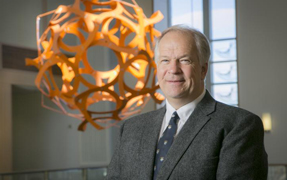SPIE Startup Challenge
The 2017 winners focused on biophotonics technologies.
 Laser-activated nanodevices for gene therapy developed by Harvard University spinoff Cellino won the top prize at the 2017 SPIE Startup Challenge during SPIE Photonics West in February.
Laser-activated nanodevices for gene therapy developed by Harvard University spinoff Cellino won the top prize at the 2017 SPIE Startup Challenge during SPIE Photonics West in February.
The contest provides $85,000 in cash prizes and other awards from founding partner Jenoptik and supporting sponsors Edmund Optics, Trumpf, Open Photonics, and the US National Science Foundation (NSF).
Cellino has developed nanofabricated substrates to efficiently and effectively deliver gene therapies to cells in order to cure viral or genetic diseases that affect the blood, such as leukemia and HIV.
SPIE member Marinna Madrid, Cellino’s chief scientific officer, made the pitch for the Harvard team, which includes SPIE member Nabiha Saklayen and Jakub Florkiewicz, an MBA student at Harvard and chief business development officer at Cellino.
The first place prize was $10,000 US from Jenoptik and $5,000 worth of products from Edmund Optics.

Madrid, Saklayen, SPIE Fellow Eric Mazur, and others from Harvard were coauthors of a paper on their technology that was presented in a conference on ultrafast optics. The paper, “Reusable titanium nitride plasmonic microstructures for intracellular delivery,” discussed a new high-efficiency, high-throughput, laser-based delivery method using laser pulses to excite plasmonic, titanium nitride (TiN) microstructures for cell poration.
Photonics entrepreneurs and SPIE Fellows Zeev Zalevsky and Adam Wax received second and third place prizes, respectively.
Zalevsky, of Bar-Ilan University (Israel), is CTO and founder of IC Touch. The company earned the second-place $5,000 prize for developing a device that allows blind or visually impaired people to “see” by translating visual information captured by a camera to spatial tactile stimulation of the cornea.
Wax, a professor at Duke University (USA), is president and chief scientist at third-place winner Lumedica. The company’s OQ EyeScope, a portable, low-cost optical coherence tomography (OCT) scanner for ophthalmology diagnostics, won the third-place prize of $2,500.
“These entrepreneurs are doing the hard work of bringing these technologies out of the lab so they can benefit the public,” said SPIE President Glenn Boreman.
A total of 37 teams with new optics and photonics technologies applied for the awards this year, with six selected for the final competition. Each had five minutes to pitch their technologies, devices, or applications as the basis for viable new businesses.
SPIE provides $2,000 in support for the finalists to attend additional entrepreneur training and investor networking sessions for further help in refining their ideas. The other finalists were:
- TriLite Technologies (Germany) RGB Laser Light Module for AR/VR, an ultracompact MEMS laser scanner for AR and VR applications, pitched by Jörg Reitterer
- Fresh Strips, ensuring quality for food, presented by Koen Nickmans
- Fastree3D, 3D vision with a LIDAR system on chip, presented by Claude Florin
“The breadth and business potential of the finalists was really impressive” said Jay Kumler, president of Jenoptik Optical Systems, after the final round of pitches on Wednesday afternoon. “All of the finalists should be congratulated on the exciting companies that they have launched.”
Earlier in the week, 22 semi-finalists participated in training sessions on business plans, funding, marketing, and presenting a business pitch.
Following the semi-finals, Rick Schwerdtfeger, director of the photonics division at NSF’s Small Business Innovation Research (SBIR) and Small Business Technology Transfer (STTR) programs, presented travel awards to SPIE member Luis Moutinho of the Universidade de Aveiro (Portugal) and NU-RISE and Cellino’s Madrid and Saklayen. Moutinho made a pitch in the semi-finals for NU-RISE’s technology for controlling radiological doses for breast and prostate cancer treatment.
Also, with the support of the French Tech Hub and University of Southern California’s Viterbi School of Engineering, SPIE also hosted a lunchtime forum in San Francisco 31 January where 13 experienced entrepreneurs, including some of the Startup Challenge participants, were given the opportunity to “fast pitch” their business to potential investors.
Judging the final round were business development experts and venture capitalists: SPIE Fellows Marc Himel of Jenoptik and Jason Eichenholz of Open Photonics; SPIE member Sam Sadoulet, president of Edmund Optics; Jenny Rooke of 5 Prime Ventures; Andreas Popp of Trumpf; and Homan Yuen of NewGen Capital.
- Have a question or comment about this article? Write to us at spieprofessional@spie.org.
- To receive a print copy of SPIE Professional, the SPIE member magazine, become an SPIE member.




